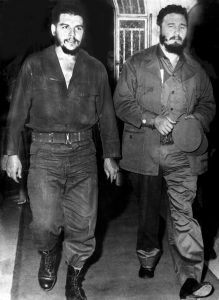President Fidel Castro, ironically, died at age 90 in his bed, eons away, it seems, from the cold nights hiding in the dangerous bushes of the Sierra Maestra Mountains on his way to launch the world’s most enduring revolution on behalf of Cuba’s poor.
Mr Castro was one of those rare leaders who devoted his whole life to working for the betterment of his compatriots, a majority of whom revered and loved him for changing Cuba from a decadent plantation society ruled by a series of dictators and used as the playground of rich Americans.

At his death he could point to a country which at one point provided full employment, free education and healthcare to all its citizens, on par with and in some cases exceeding the standards of developed countries.
But his charismatic rule from 1959 to 2008 was heavily criticised for not allowing the conventional two-party democracy, a free press and capitalist enterprises. One of his several failures was in not being able to reduce the role of sugar. While Mr Castro was admired for his unwavering commitment to his ideals, that consistency made him inflexible in modifying the Cuban economic model, leaving it behind the modern world.
Sponsored Links
Why This Razor Is Causing So Many Guys To Switch
Harry’s
Big Bang Theory Season 11 Cancelled: Kaley Cuoco Confirms On Jimmy Kimmel?
The Wonder Nation
As a law student at the University of Havana, Mr Castro became involved in political activity. His first attempt to overthrow the dictatorship of the Batista regime by attacking the Moncada Barracks in 1953 ended in failure and imprisonment. He claimed the morality of his actions in his famous speech at his trial: “History will absolve me.”
He succeeded on his second attempt in what has become the stuff of romantic legend. He and 81 men sailed on a small yacht, the
Granma, from Mexico and got lost in the Sierra Maestra mountains.
The United States opposed Mr Castro’s Government, which contributed in his transformation from a radical nationalist in the 26th of July Movement to a Soviet-inspired Communist.
Mr Castro will be especially remembered for sending Cuban troops to fight for the liberation movements in Southern Africa and to break the stranglehold of the military of Apartheid South Africa. His support for the Non-Aligned Movement and his advocacy for self-determination, anti-imperialism and alternative economic development gained him respect in the developing world.
His provision of medical doctors to help numerous countries won Mr Castro acclaim and goodwill for Cuba. Although being poor itself, Cuba educated thousands of foreign students, including Jamaicans under close relations promoted by late Jamaican Prime Minister Michael Manley.
Mr Castro was a mentor to radical leaders such as Venezuela’s Hugo Chavez whose reciprocity took the form of supplying oil through the PetroCaribe arrangement. It was Mr Castro who suggested extending it to the rest of the Caribbean.
He survived many attempts to remove him, notably in the Bay of Pigs fiasco, botched assassination attempts and the longest running economic blockade. He lived, however, to see a dramatic thawing of relations with the United States under President Barack Obama.
The name Fidel Castro will remain indelibly etched in human history and continue to inspire those committed to a better world for mankind. But only time will tell whether, as he boldly prophesied, history will absolve him.
